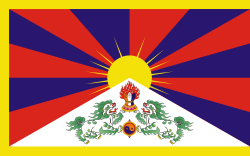Support the people of Tibet and stand up against Chinese bullying
The International Monetary Fund forecast that the Chinese economy will grow by 7.5% this year. China continues to be the world’s second largest economy after the United States, albeit that there are internal tensions within the Chinese economy that give rise to discussions about overheating and possible collapse. At this time, alongside its continued economic growth, there has been a rise in Chinese military capabilities. Its security forces are also used to suppress ethnic discontent within its current borders including in Tibet.
After the Chinese invasion of Tibet in 1950 and then under duress in 1951 the Tibetans were forced to witness the People’s Republic of China assuming sovereignty over their country. After a number of years of Tibetan guerrilla warfare against the Chinese Army, the Tibetan uprising of 1959 saw the 14th Dalai Lama being forced into exile and establishing a Tibetan government abroad. The Dalai Lama won the Nobel Peace Prize in 1989 and calls for the peaceful liberation of Tibet. He remains the spiritual leader and advocate for Tibetans inside and outside of Tibet.
Since the emergence of the Chinese economy there have been increased efforts by other nations to form trade deals with China. This is despite the continued suppression of the Tibetan people with widespread allegations of torture and execution. The Chinese government has sought to bully those nations seeking trade deals with it to disassociate themselves from the Dalia Lama and the struggle for freedom by the Tibetan people. This should not be allowed to happen and strong support for freedom for Tibet should be made clear at any such trade and investment negotiations with China.
Not least this should be the case with any of the Celtic nations seeking trade deals with China. At the moment the Manx (Isle of Man) Government is pushing hard for trade and investment with China. As witnessed by this news item in both Manx Gaelic and English on Manx Radio’s news website:
‘Reiltys shirrey shirveishyn son y Çheen
Ta lught y Rheynn Lhiasaghey Tarmaynagh shirrey sleih oddys 'creck' Mannin sy Çheen. T'ad cuirrey sleih as anaase oc er daa horçh dy startey - çhaghterys-dellal har mooir as shirveishyn-mean har mooir. Ta ny startaghyn bentyn da pohlldal çhaghteraghtyn-dellal sy Çheen as bishaghey fys er brand Vannin ayns shid. Foddee oo feddyn magh ny smoo er ynnyd-eggey yn reiltys ec gov.im - as foddee oo yeearreydys y chur stiagh gys Jeheiney yn hoghtoo laa Mee Luanistyn.’
‘Government seeks China services
The Department of Economic Development says it's looking for people who can sell the Isle of Man in China. It's inviting expressions of interest for two roles - overseas business representation and overseas media services. The roles involve supporting trade delegations to the country and building brand awareness there. You can find out more on the government's website gov.im - and you have until Friday, August 8 to apply.’
The question is has the Manx government made clear its support for the Dalai Lama and rights of the Tibetan people to China? Certainly the Manx people need to make it clear to their political representatives that they expect this.
The same applies to the Irish government whose Department of Foreign Affairs and Trade boasted about coordinating six visits by Government ministers to China in 2013 in order to boost trade and investment. Did they also raise the question of Tibet?
Let us also be clear where China stands on the autonomy of Celtic nations. In June 2014 Chinese Premier Li Keqiang visited London and standing beside British Prime Minister David Cameron (Cameron has not been seen anywhere near the Dalai Lama recently) called for the United Kingdom to remain united in reference to Chinese opposition to Scotland’s independence. Clearly he does not want the independence movement of Scotland to achieve a yes vote. Because the last thing China wants is a Scottish Yes vote giving inspiration to other independence movements in Europe including Catalonia’s campaign for autonomy from Spain. That in turn would encourage those further afield such as Tibet who seek freedom from Chinese oppression. Not that the Chinese will be giving the Tibetan people any voting rights on autonomy, just as the Spanish will not be giving a referendum on independence to Catalonian’s.
So in all of this drive for trade with China, let us make it clear that we stand firmly for the civil liberties and freedom of Tibet and its people.

- Alastair Kneale's blog
- Log in to post comments






